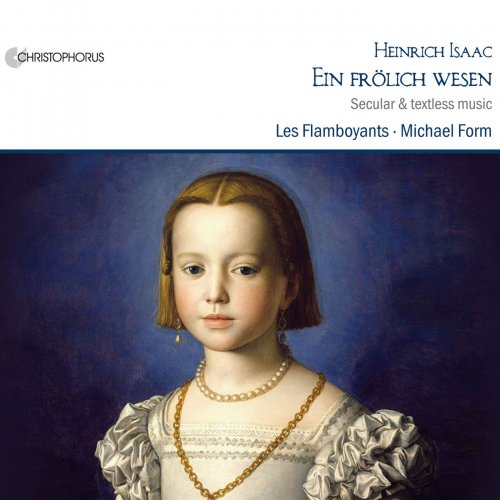
Les Flamboyants, Michael Form - Isaac: Ein Frölich Wesen (2012)
BAND/ARTIST: Les Flamboyants, Michael Form
- Title: Isaac: Ein Frölich Wesen
- Year Of Release: 2012
- Label: Christophorus
- Genre: Classical
- Quality: flac lossless (tracks) +Booklet
- Total Time: 01:02:13
- Total Size: 290 mb
- WebSite: Album Preview
Tracklist
01. Palle, palle
02. Tart ara
03. J'ay pris amours a 3 [Codex Cordiforme, Paris, Bibliotheque Nationale, Res. Vmc., Ms 57]
04. J'ay pris amours a 3
05. J'ay pris amours a 4
06. La Spagna: Missa La Spagna: Agnus Dei II
07. Et ie boi autant
08. In meinem Sinn a 4
09. Wilfflingseder
10. De tous biens pleine - Et qui le dira
11. Mon pere m'a donne mari a 4
12. Florence
13. Een vroylic wesen
14. Missa Een vrolic wesen
15. Ain frewlich Wesen
16. Le serviteur hault guerdonne
17. Le serviteur
18. Tristitia vestra
19. Der Hundt: Das kind lag in der wiegen - Secunda pars
20. Benedictus qui venit
21. Fortuna in mi
22. Nunqua fu pena magiore
23. Numqua fue pena maior
24. Par ung jour de matinee
25. Fortuna desperata
26. Fortuna desperata
27. Sanctus Fortuna desperata
28. Bruder konrad [Berlin, Staatsbibliothek, Preussischer Kulturbesitz, Mus.-Ms. Z. 98]
29. Missa carminum: Frater Conradus
30. Fortuna - Bruder Conrat
31. Fortuna disperata - Sancte petre - Ora pro nobis
Henricus Isaac was one of the most famous and most highly regarded composers of his time; his music was so popular that it was still being printed in 1555, 38 years after his death, by Hieronymus Formschneyder in Nuremberg. Thanks mainly to the efforts of Guido Adler, the young field of musicology at the beginning of the 20th century applied itself to making a case for Isaac. Prompted by Adler, Anton Webern wrote his dissertation at Vienna University on the second part of Isaac's Choralis Constantinus in 1909. It is no great surprise that general interest focused on Isaac's monumental oeuvre of sacred music—no other composer of the Renaissance wrote a greater number of mass cycles. His secular songs could not but appear pale in comparison despite the fact that precisely some of these songs, such as Innsbruck, ich muss dich lassen ("Innsbruck, I must part from thee") were held in unparalleled regard. Unfortunately, Isaac's music became increasingly marginalised in the course of the second half of the twentieth century and is currently—and unduly—neglected, as reflected by the lack of a complete edition of his work. Aside from some performing editions and anthologies, his secular works in particular are only available in an edition by Johannes Wolf (Vienna, 1907), which is in dire need of a revision.
01. Palle, palle
02. Tart ara
03. J'ay pris amours a 3 [Codex Cordiforme, Paris, Bibliotheque Nationale, Res. Vmc., Ms 57]
04. J'ay pris amours a 3
05. J'ay pris amours a 4
06. La Spagna: Missa La Spagna: Agnus Dei II
07. Et ie boi autant
08. In meinem Sinn a 4
09. Wilfflingseder
10. De tous biens pleine - Et qui le dira
11. Mon pere m'a donne mari a 4
12. Florence
13. Een vroylic wesen
14. Missa Een vrolic wesen
15. Ain frewlich Wesen
16. Le serviteur hault guerdonne
17. Le serviteur
18. Tristitia vestra
19. Der Hundt: Das kind lag in der wiegen - Secunda pars
20. Benedictus qui venit
21. Fortuna in mi
22. Nunqua fu pena magiore
23. Numqua fue pena maior
24. Par ung jour de matinee
25. Fortuna desperata
26. Fortuna desperata
27. Sanctus Fortuna desperata
28. Bruder konrad [Berlin, Staatsbibliothek, Preussischer Kulturbesitz, Mus.-Ms. Z. 98]
29. Missa carminum: Frater Conradus
30. Fortuna - Bruder Conrat
31. Fortuna disperata - Sancte petre - Ora pro nobis
Henricus Isaac was one of the most famous and most highly regarded composers of his time; his music was so popular that it was still being printed in 1555, 38 years after his death, by Hieronymus Formschneyder in Nuremberg. Thanks mainly to the efforts of Guido Adler, the young field of musicology at the beginning of the 20th century applied itself to making a case for Isaac. Prompted by Adler, Anton Webern wrote his dissertation at Vienna University on the second part of Isaac's Choralis Constantinus in 1909. It is no great surprise that general interest focused on Isaac's monumental oeuvre of sacred music—no other composer of the Renaissance wrote a greater number of mass cycles. His secular songs could not but appear pale in comparison despite the fact that precisely some of these songs, such as Innsbruck, ich muss dich lassen ("Innsbruck, I must part from thee") were held in unparalleled regard. Unfortunately, Isaac's music became increasingly marginalised in the course of the second half of the twentieth century and is currently—and unduly—neglected, as reflected by the lack of a complete edition of his work. Aside from some performing editions and anthologies, his secular works in particular are only available in an edition by Johannes Wolf (Vienna, 1907), which is in dire need of a revision.
As a ISRA.CLOUD's PREMIUM member you will have the following benefits:
- Unlimited high speed downloads
- Download directly without waiting time
- Unlimited parallel downloads
- Support for download accelerators
- No advertising
- Resume broken downloads


